Fishermen acquire the talent.
They start out lying to themselves and, before they know it,
they're lying to anyone who'll listen.
—Paul Quinnett
The Latin word for witness is testis, which—according to ancient lore—arose because male Romans testifying in court were required to place one hand over their “jewels” as they swore to tell the truth, the whole truth, and nothing but the truth. Thanks to the sensible evolution of modern law, this threat has since weakened to the more moderate pains and penalties of perjury. But even that is too much for most of us to tolerate, so we fishermen swear no oaths.
We lie because people expect us to. Unlike the duplicitous politician with one hand on our shoulder and the other in our pocket, we mean no harm. We revise and stretch the truth to protect our egos and reputations from the woeful certainty that most of our casts don’t catch fish, and—unless we fish in Lake Woebegone—most of the fish we catch are smaller than average. To paraphrase C. S. Lewis, pride gets no pleasure from catching some fish, only from catching more and bigger fish than the next guy.
Here in the Upper Peninsula of Michigan, another type of fish story protects our secret places—our Shangri-Las—from the harsh reality that the great places to fish are great because few people fish them. Understandably, then, the few fortunate fishermen who find these places guard their secrets with the noblest of fish stories. “Ever fish the North Branch?” you ask. “No,” they lie.
On occasion, a person motivated by self-pride and a compulsive need for the approval of others stumbles into great fishing. Believing the coveted status of local fishing demigod is finally within their grasp, they draw maps, guide trips, and do whatever it takes to convince all of their friends—and most of their foes—that they have found and experienced spectacular fishing. John Voelker called these people kiss-and-tell fishermen, and, without exception, he did not fish with them. “Most fishermen swiftly learn,” he wrote, “that it’s a pretty good rule never to show a favorite spot to any fisherman you wouldn’t trust with your wife.”
When a kiss-and-tell fisherman sees great fishing destroyed by their self-aggrandizing actions, the results are almost always chronic and severe. “Tis better to have loved and lost than never to have loved at all” is excellent counsel for matters as simple and ordinary as personal relationships. But Lord Tennyson’s creed rings hollow for something as complex and rare as great fishing. Experience, many have said, is something you don’t get until just after you need it. And there is nothing—absolutely nothing—a fisherman with this type of experience will do to endanger their fishing again.
Several years ago, a friend who spends a few weeks each summer in the Upper Peninsula asked if I’d take him fishing. He’s a good guy, and, most of the year, he lives over a thousand miles away. So I took him to one of my favorite spots. The place is remote enough to feel like it’s out there but still accessible enough that it’s easy to get there. I explained the harm the wrong people could inflict on a place like this, and he seemed to understand.
Last summer, I ran into my friend and a couple of his cousins who, unlike my friend, do not live over a thousand miles away. They were fishing the next day, and my friend asked if I could recommend some spots for them to try.
“Don’t worry,” he whispered as he pulled me aside, “I won’t tell them about your secret place.” He opened his gazetteer to the region they planned to fish, and I started to show them a few widely-known spots with easy access and decent fishing.
“What’s that?” one of the cousins asked as he pointed his chunky finger—notable for what I recognized as worm dirt under his fingernail—toward a red circle drawn around a river bend with the frightful designation: Tim Schulz Honey Hole!!!!
“Get over it, Tim. You don’t own the river,” my wife said while I pouted and brooded for the next several weeks. Her wisdom exceeds mine on many matters, but this is something she simply doesn’t understand. With assistance from the fine people of the Glenlivet distillery, I worked my way through denial, anger, bargaining, and depression. Just as I finished with acceptance, I received a compelling note from my friend Jerry Dennis:
If I could get up your way today and tomorrow could you fish? This is wild-hair time. Need a getaway.
Jerry's book, A Place on the Water, is one of the first books I read about fishing and living in the Upper Peninsula. In addition to giving me optimism during a challenging time in my life, his book has been a guide for how I view the outdoors in general and the Upper Peninsula in particular. The comfort and joy I've received from Jerry's writing should have been enough, but one sentence he wrote in another book settled it:
Maybe, just maybe, if you strapped me to a chair with barbed wire, shoved ice picks under my fingernails, set fire to my hair, and crushed my toes one after another with pliers, I'd tell you where I caught that big brown trout last summer.
After the catastrophe with the cousins, I swore I'd never share a fishing spot again, but, geez, if I couldn't trust Jerry with a secret spot, who could I trust? So I took him to a place even better than my no-longer-secret honey hole.
A few weeks after his visit, I met up with Jerry in the Lower Peninsula. He was an awful mess. His head was devoid of hair and covered in ghastly scars; his feet mangled and confined by calf-high casts; his fingers so badly swollen he could barely grasp the crutches he used to steady his stance. My immediate concern, of course, was that he had cracked and given up my spot. But his proud smile and subtle wink assured me my secret was still safe.
Jerry was returning the favor. He took a few of his friends and me to a secret place called Alligator Bend, and although I didn't catch many fish, I made some new friends. One was a talented artist named Chad who took me to a secret place called The River later in the week. On my way back to the Upper Peninsula, I visited another dear friend named Adam, and he took me to a secret place called The Creek. I had a blissful week of fishing, but none of it would have happened if my friends hadn't shared their secrets with me.
Lewis Carroll said one of the deep secrets of life is that all that is really worth the doing is what we do for others, and this is the challenge of the fisherman's secret spot. Voelker didn't warn us not to share our secret places; he only warned us to pick our partners well.

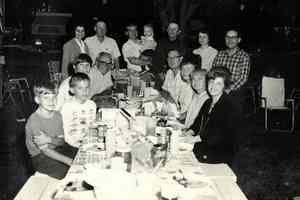


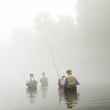
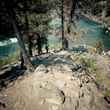
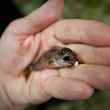








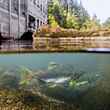
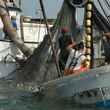








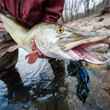

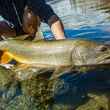


Comments
Glenn Dotter replied on Permalink
I am pretty much a one man fisherman and hunter. I respect the guys who do videos without telling where they are. While I buy books that tell favorit creeks an rivers, I also wonder what damage os being done, bu it is a free country. The writer makes some good points. If a freind shares a favorite fishing spot. Share it with him or her only. Dont take others. If you want to share a story, fine. But, when one of your friends asks you to take them to that spot, simply tell them you are respecting you friends wishes.
Pages